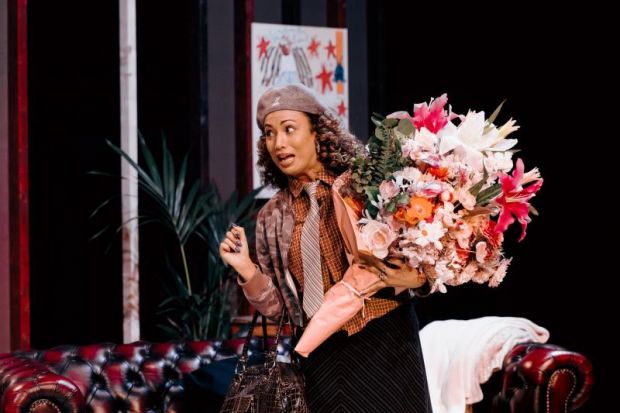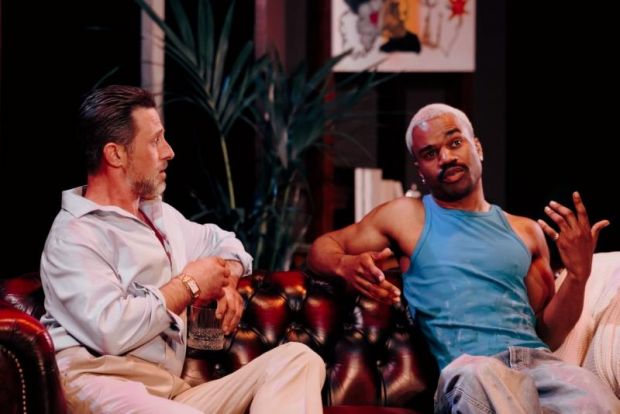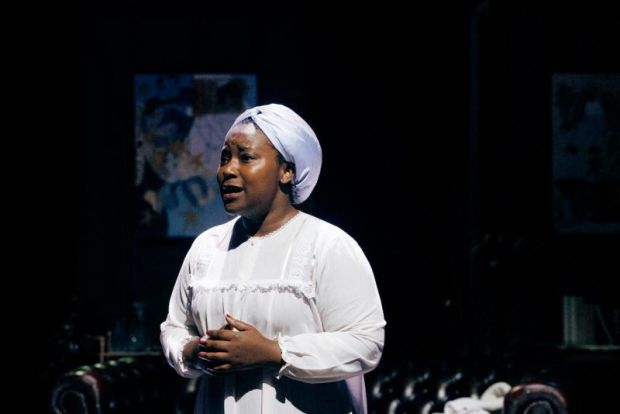I Met an Angel Named Jacques
I Met an Angel Named Jacques is a passionate play, filled with strong, naked emotions at high pitch and with traumatic, destructive secrets. The playwright himself uses the term ‘operatic’ in his statement, and we can see what he means.
Black artist L’Or (the playwright and director Gideon D Wilonja) has become famous (Basquiat is a reference point and mentioned several times). He is famous enough to be interviewed by cool, dangerous journalist Jacques (a relaxed and confident Ras- Samuel) in the luxury mansion where L’Or lives with his white fiancé, filmmaker Iris (Benjamin Chisholm) and cool, calm black House Manager – as she calls herself – Mimi (Sasha Hennequin).
Jacques’ visit rattles L’Or and that seems to be Jacques’ intention. He’s not that impressed by L’Or’s fame and he seems to know rather more than L’Or wants him to know. At the same time, as we’ll learn, L’Or carries a double burden of guilt exacerbated by Blandine (Atinuke Abraham), his deeply religious – and judgemental – mother who’s in denial about L’Or’s sexuality.

Jacques, meanwhile, has dark secrets of his own, and there is a twisted power struggle between him and Iris too... In scene after scene, we see one character attempt to dominate another – each for their own reasons. Iris, because he is white (albeit ineffectual), clearly feels entitled and becomes almost incoherent when thwarted. L’Or can only be devastated as he learns of Jacques’ plan for revenge – and the reveal of the reasons for it. Mimi, meanwhile, is ironically distant from all these conflicts and her charming presence provides moments of relief.
This rich, intelligent mix, however, becomes confusing as the play proceeds in a series of reveals of the past – in flashbacks or dialogue - that bring conflicts in the present into focus. But the non-linear storytelling risks us disengaging as we struggle to take in more information and catch up. Things’re not helped by Jacqueline Tran’s naturalistic and over-detailed and therefore fixed set.
I wondered why Atinuke Abraham’s Blandine, such an important and malign influence on ‘Lor’s life and sanity, plays her appearances as comedy caricature. Maybe that’s Abraham’s usual persona: she certainly got a lot of knowing laughter from the audience – but is that in keeping with Blandine’s dramatic function?

Crucially, important exposition – and there is a lot of exposition – is not always clear, due to unfortunately poor diction and projection from Wilonja himself and, to a lesser extent, Chisholm. The naturalistic mumble often holds sway. As director, Wilonja should have been aware of this – or someone should.
Clearly, Wilonja has profound and incisive insights into black celebrity and black-white power struggles and exploitation. The problem is that these powerful elements need a tighter structure and sharper focus. They can be conveyed more economically. Whose story is it? It would seem to be L’Or, but he too often seems a reactive character and Jacques almost takes over the play. By the end we might wonder what L’Or is left with.

His quietly resuming his painting is a fine way to end things but the painful conflicts and guilts he lives with are unresolved. Perhaps Wilonja wants to say these things can’t be resolved, so therefore L’Or’s strength and resilience are demonstrated and it’s best for him just to get on with what he loves and does best.
The flaws in this production weaken the play’s strengths; more development and a more objective director might be needed.
Michael Brindley
Photographer: wani toaishara
Subscribe to our E-Newsletter, buy our latest print edition or find a Performing Arts book at Book Nook.

